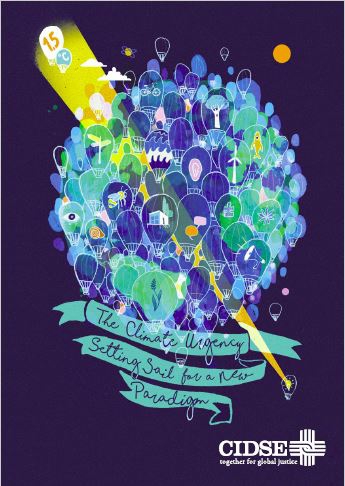
CIDSE network analyses the radical and urgent change needed to limit global warming to 1.5°C, looking at the energy and agriculture sectors and society as a whole.
The climate Paris Agreement, signed by governments in 2015, sets the goal of holding warming “well below 2°C and pursuing efforts to limit this increase to 1.5°C above preindustrial levels”. Limiting global warming to 1.5°C is necessary and urgent– to see consequences of climate change we don’t need to look far: the heatwaves that occurred in Northern Europe this summer are just one example. In other places however, such as coastal areas or tropical areas, consequences are usually stronger and more catastrophic. Efforts currently deployed by states are not adequate to reach the target, and without a serious change of course the likelihood to limit global warming is extremely low.
The CIDSE network, with partners from over 120 countries, includes people who see and live every day the consequences of climate change and are testing new strategies to adapt and fight for solutions. It is thanks to the inspiration provided by their experiences that this new report explores how a deep and rapid shift in our food and energy systems, supported by structural lifestyle changes could greatly contribute to limit rise in average global temperatures to 1.5°C without relying on risky and unproven Negative Emissions Technologies or geoengineering.
Energy production and consumption is responsible for two-thirds of total GHG emissions and 80% of CO2. “It is of outmost urgency that this sector enters a process of deep transformation, requiring a complete phase out from fossil fuel energy and a rapid shift towards renewable energy sources” – said Giulia Bondi, Climate Justice and Energy Officer at CIDSE. At the same time, energy poverty must be addressed, and access improved, with finance redirected to decentralized renewable energy systems. Evidence shows that a future of 100% renewable energy for all is possible, addressing climate change and strengthening local communities at the same time. Equity and common but differentiated responsibilities are key principles that must guide such a transformation in order to leave no one behind without falling into the greenwashing trap.
Food and agriculture are also responsible for a large share of global GHG emissions (up to 50% if we take into account the whole food chain). Limiting the temperature rise to 1.5 °C requires working on a tremendous shift in the organisation of our agriculture and food systems, not only tackling emissions but also taking into account the right to food for all. “We believe that agroecology is the way to move away from a model that threatens present and future agricultural production and food security, while meeting the long-term goal of 1.5°C”, said Francois Delvaux, Climate & Agriculture and Food Sovereignty Officer at CIDSE.
The solutions proposed in the field of energy and agriculture are already proven to work at scale, unlike other solutions such as negative emissions and geoengineering: processes involving an intervention in carbon, water and weather cycles. Their impact isn’t clear and there is no plan to discuss a fair distribution of them. They don’t have any ecological or sociological approach which should be central to any lasting and long-term climate solution. The report carefully analyses many of the risks presented by these technologies.
While addressing the energy and agriculture sector is crucial, for the required changes to happen a courageous paradigm shift is required at multiple levels. We should challenge consumption habits and the narrative of infinite growth. We need to question the current framing of development and progress, which lead to the destruction of our planet. We should allow ourselves to imagine an economy beyond growth and consider a scenario where, to tackle the multiple environmental, social, economic, and political crises, we look at degrowth as an alternative societal approach.
We are again inspired by our partners in building a new narrative for that – a narrative which is not merely based on consumption. This should help us grasp the significance of our lives, lifestyle and consumption choices in contributing to the just transition and empowering citizens in their behavioural and political choices.
Notes to the Editors:
The lead authors of the report Giulia Bondi, Climate Justice and Energy Officer and Francois Delvaux, Climate & Agriculture and Food Sovereignty Officer are available for interviews.
For any media queries please contact: Valentina Pavarotti, CIDSE Media and Communications Officer, pavarotti(at)cidse.org
CIDSE is an international family of Catholic social justice organizations working together with others to promote justice, harness the power of global solidarity and create transformational change to end poverty and inequalities. CIDSE brings together 18 member organizations from Europe and North America and its international secretariat is based in Brussels.
Relevant CIDSE resources:
–The Principles of Agroecology
-Climate Action for the Common Good
–Paris, for the People and the Planet
CIDSE-The_Climate_Urgency_Sept_2018_1.pdf
Executive_summary_-The_Climate_Urgency_1.pdf
